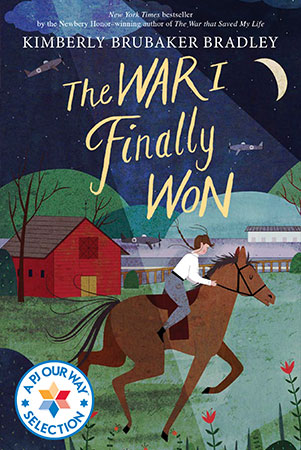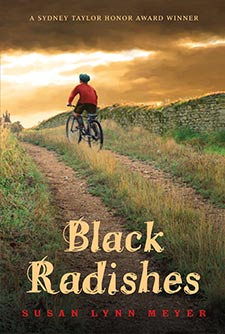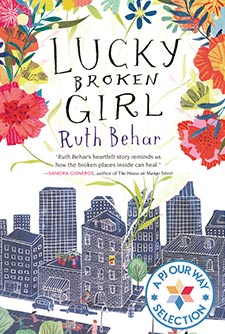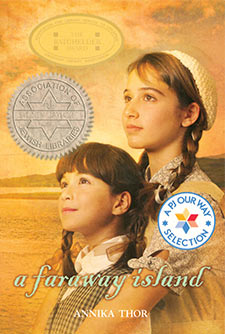The War I Finally Won
When war breaks out, Ada moves to the countryside with her younger brother and their guardian into a small cottage owned by the bossy Lady Thornton. Then Lady Thornton moves in, too, with her daughter, Maggie. With the arrival of Ruth, a German Jewish refugee, the cottage becomes even more crowded and uncomfortable. Luckily, Lady Thornton’s got beautiful horses for everyone to ride. Everyone except Ruth. Because she’s German.
Average Rating
( hint: Login to leave a review! )
170 Reviews
Leave Review
What the Book is About
Jewish Content & Values
Positive Role Models
Content Advisory
Talk it Over!
More for You
What the Book is About
Eleven-year-old Ada’s clubfoot and abusive mother have left her suspicious of kindness and afraid to believe that anything good could happen to her. When she and her younger brother, Jamie, go to live with their guardian, Susan, on the country estate of imperious Lady Thornton, and then Jewish refugee Ruth comes to live with them, Ada discovers that, even during the hardships and uncertainties of war, happiness and even love can be found.
Set in the British countryside during World War II, this is a simply wonderful book. It has emotional complexity and depth, well-rounded characters, themes of found family, resilience, tolerance, and belonging. It also has plenty of elements of a children’s fiction classic, including a strong, relatable heroine, orphans and horses! The sequel to the Newbery Honor Book The War That Saved My Life, The War I Finally Won works equally well as a standalone novel and received starred reviews in Publisher’s Weekly, Kirkus, and The Horn Book. Highly recommended for parents as well as children!
Jewish Content & Values
- Ruth faces a range of different attitudes as a German-Jewish refugee in wartime Britain, with some people mistrusting her because they are not aware of the perilous situation the Jews are facing. They perceive her as German and therefore the enemy.
- As a Jewish refugee staying with a non-Jewish family in the English countryside, Ruth keeps kosher as best she can and explains that Jews are given cheese rations instead of bacon.
- Ada doesn’t know anything about religion, and Susan explains some basics about Judaism to her.
- On Passover, Susan does her best to make a small seder for Ruth, with salt water, parsley, and wine. Ruth asks the first of the four questions and also gives the answer. Ruth goes to see her mother, who is in an internment camp, for two weeks over the High Holy Days.
- Jonathan briefly mentions that one of his best friends in the Royal Air Force is Jewish and is worried about family in Poland.
Positive Role Models
- Ada faces many challenges, both physical and emotional, and gradually is able to trust and be kind to others. She has grown up in poverty, but when she is given an expensive horse, instead of keeping this wonderful gift, she gives the horse to Ruth because she knows that it will help Ruth’s own emotional wounds to heal.
- Jonathan, the son of Lady Thornton, grows up with wealth and privilege but treats everyone as equal regardless of their background.
- Lady Thornton is a product of her time and class, initially believing that her privilege makes her superior to those with less money and social status. However, she generously pays for surgery on Ada’s clubfoot and allows Susan and the children to live in a cottage on her estate. Over time, Lady Thornton learns to do her share of the work and to value people as individuals rather than because of their background.
- Susan is the foster mother of Ada and her brother Jamie. Susan, grieving the loss of her beloved Becky, and with no plan to have children, nevertheless takes in the orphaned brother and sister and treats them with love and kindness as though they were her own children. It is Susan’s care that enables Ada finally to trust, to love, and to find happiness.
Content Advisory
This book is set during World War II. During and before the events of the novel, several people die, (spoiler alert) including the kind RAF airman Jonathan Thornton, Susan’s beloved Becky, and Ada’s friend Stephen’s family. Ada and Becky refer to the complicated and abusive behavior of Ada and Jamie’s mother, who dies early in the book. Kids might find it difficult to read that Ada does not mourn her mother, who was cruel to her throughout her childhood. During the novel, Ruth finds out in a letter that her grandmother in Germany has died in a concentration camp.
Talk it Over!
One night, Ada rides Jonathan’s horse, the thoroughbred Oban. Jonathan can see how happy Oban makes Ada, and his parents give the horse to her, but Ada immediately gives him to Ruth. If you were Ada, would you have kept Oban or given him away? Why?
More for You
Although it is not directly stated in the book, Lord Thornton works at Bletchley Park, where teams worked to crack the Germans’ codes and were key in helping to win the war. Lord Thornton has an interest in training the mathematically talented Ruth to help at Bletchley Park, and in reality, many Jews, both British- and foreign-born, worked there as codebreakers because of their skills in math and languages. The Jewish staff went to Shabbat dinner at the home of the Bogush family, the only Jewish family in the village, and many of the younger Jewish staff were academics who planned to, and did, emigrate after the war to help build the modern state of Israel.
What the Book is About
What the Book is About
Eleven-year-old Ada’s clubfoot and abusive mother have left her suspicious of kindness and afraid to believe that anything good could happen to her. When she and her younger brother, Jamie, go to live with their guardian, Susan, on the country estate of imperious Lady Thornton, and then Jewish refugee Ruth comes to live with them, Ada discovers that, even during the hardships and uncertainties of war, happiness and even love can be found.
Set in the British countryside during World War II, this is a simply wonderful book. It has emotional complexity and depth, well-rounded characters, themes of found family, resilience, tolerance, and belonging. It also has plenty of elements of a children’s fiction classic, including a strong, relatable heroine, orphans and horses! The sequel to the Newbery Honor Book The War That Saved My Life, The War I Finally Won works equally well as a standalone novel and received starred reviews in Publisher’s Weekly, Kirkus, and The Horn Book. Highly recommended for parents as well as children!
Jewish Content & Values
Jewish Content & Values
- Ruth faces a range of different attitudes as a German-Jewish refugee in wartime Britain, with some people mistrusting her because they are not aware of the perilous situation the Jews are facing. They perceive her as German and therefore the enemy.
- As a Jewish refugee staying with a non-Jewish family in the English countryside, Ruth keeps kosher as best she can and explains that Jews are given cheese rations instead of bacon.
- Ada doesn’t know anything about religion, and Susan explains some basics about Judaism to her.
- On Passover, Susan does her best to make a small seder for Ruth, with salt water, parsley, and wine. Ruth asks the first of the four questions and also gives the answer. Ruth goes to see her mother, who is in an internment camp, for two weeks over the High Holy Days.
- Jonathan briefly mentions that one of his best friends in the Royal Air Force is Jewish and is worried about family in Poland.
Positive Role Models
Positive Role Models
- Ada faces many challenges, both physical and emotional, and gradually is able to trust and be kind to others. She has grown up in poverty, but when she is given an expensive horse, instead of keeping this wonderful gift, she gives the horse to Ruth because she knows that it will help Ruth’s own emotional wounds to heal.
- Jonathan, the son of Lady Thornton, grows up with wealth and privilege but treats everyone as equal regardless of their background.
- Lady Thornton is a product of her time and class, initially believing that her privilege makes her superior to those with less money and social status. However, she generously pays for surgery on Ada’s clubfoot and allows Susan and the children to live in a cottage on her estate. Over time, Lady Thornton learns to do her share of the work and to value people as individuals rather than because of their background.
- Susan is the foster mother of Ada and her brother Jamie. Susan, grieving the loss of her beloved Becky, and with no plan to have children, nevertheless takes in the orphaned brother and sister and treats them with love and kindness as though they were her own children. It is Susan’s care that enables Ada finally to trust, to love, and to find happiness.
Content Advisory
Content Advisory
This book is set during World War II. During and before the events of the novel, several people die, (spoiler alert) including the kind RAF airman Jonathan Thornton, Susan’s beloved Becky, and Ada’s friend Stephen’s family. Ada and Becky refer to the complicated and abusive behavior of Ada and Jamie’s mother, who dies early in the book. Kids might find it difficult to read that Ada does not mourn her mother, who was cruel to her throughout her childhood. During the novel, Ruth finds out in a letter that her grandmother in Germany has died in a concentration camp.
Talk it Over!
Talk it Over!
One night, Ada rides Jonathan’s horse, the thoroughbred Oban. Jonathan can see how happy Oban makes Ada, and his parents give the horse to her, but Ada immediately gives him to Ruth. If you were Ada, would you have kept Oban or given him away? Why?
More for You
More for You
Although it is not directly stated in the book, Lord Thornton works at Bletchley Park, where teams worked to crack the Germans’ codes and were key in helping to win the war. Lord Thornton has an interest in training the mathematically talented Ruth to help at Bletchley Park, and in reality, many Jews, both British- and foreign-born, worked there as codebreakers because of their skills in math and languages. The Jewish staff went to Shabbat dinner at the home of the Bogush family, the only Jewish family in the village, and many of the younger Jewish staff were academics who planned to, and did, emigrate after the war to help build the modern state of Israel.




